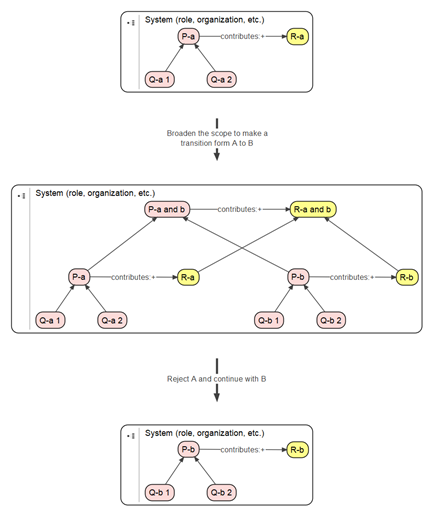Different P-R
A different P-R is a disruptive kind of change. It means that the current reason for existence (raison d’être) has run its course. There are two options. Either the system ceases to exist or the system is transformed into a new system with another reason for existence. The latter case is elaborated here.
The basic idea is that during a transition period two P-R’s are in place, the original one and a new one that is being developed until it is matured to a point that the original P-R can be abandoned. A typical example is IBM. In the early years of computers, IBM was highly successful with developing large and expensive mainframe computers. Unfortunately, they missed the boat with micro-computers, which eventually made mainframes almost redundant. The advent of micro-processors, giving rise to a large micro-computer market, was a disruptive event for IBM in the sense that they could not keep up with the competition. They had no choice but to reinvent their business strategy, which was switching to be mostly a research and software service company.
The transition process is shown in the picture below. It just shows the basic scheme that can be varied in many ways.
Another example of a company in transition is Shell. Shell was, and still is, an oil and gas company. But the days of fossil energy are coming to an end. Therefore, Shell, and other oil and gas companies as well, are already in transition to more sustainable energy resources. In fact, by doing so, there reason for existence has been broadened to cover all kind of energy resources in order to abandon oil and gas in due time.
Disruptions do not only happen on a grand scale, but also on a personal level someone can go through a transition. A person dealing with a progressive disease, like cancer, might get a different perspective of life. What was once important, such as getting fulfillment out of work, might be exchanged for even more valuing family and friends.
A practical way to deal with radical change is presented in Reframing - The art of thinking differently (Karim Benammar, 1 juni 2012) that fits in the PQR framework. For reframing, two elementary questions should be asked: “Why do we do the things that we do?” and “How can we do things differently?” The method of reframing is centered around replacing one core belief with another. It comprises four steps:
- Determine a core belief;
- Find supporting beliefs and choose the four most important ones;
- Construct opposites of the supporting beliefs and make them extreme;
- Determine a reframed core belief.
An example of a core belief is: current automobile production is not sustainable. By following the four steps, the opposite belief is reached: sustainable automobile production is possible, by adopting a new set of supporting beliefs, such as envisioning the use of different, but sustainable energy sources and materials, and the implementation of a circular production process. Reframing can be done at all levels, ranging from a personal, an organization to a global, world-wide level.
- Lees hiervoor:
- Lees hierna:
Referenties
- Reframing - The art of thinking differently, Karim Benammar, Boom, 1 juni 2012.

